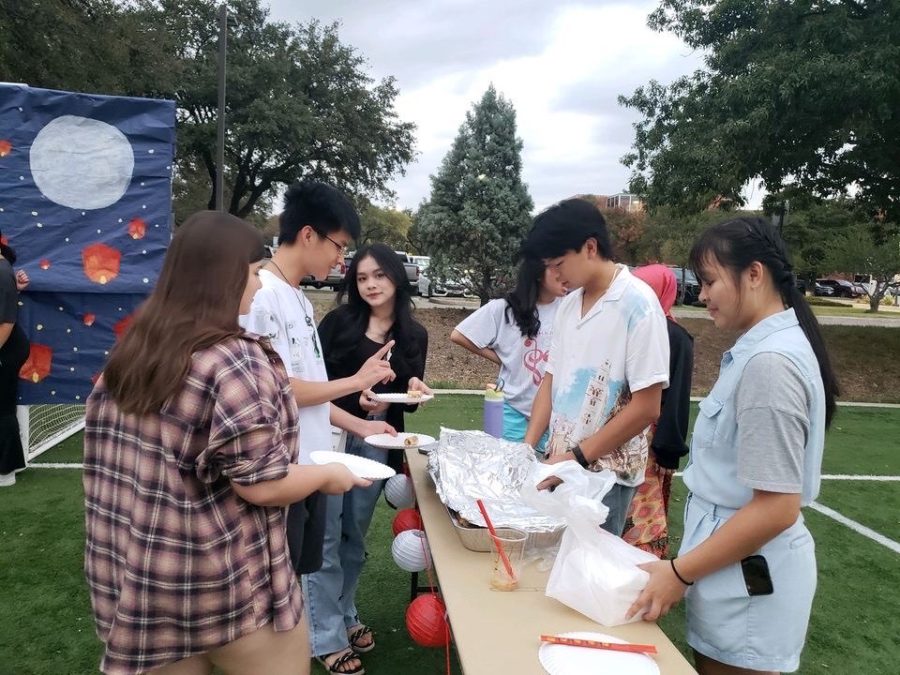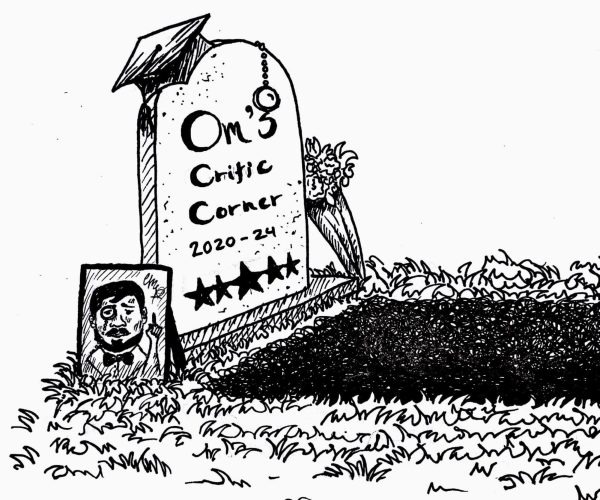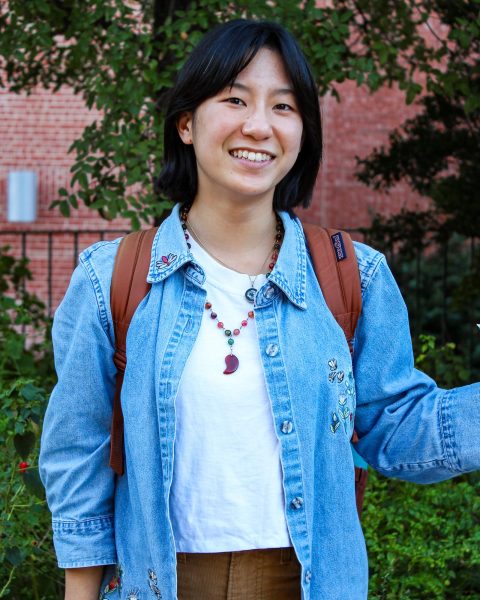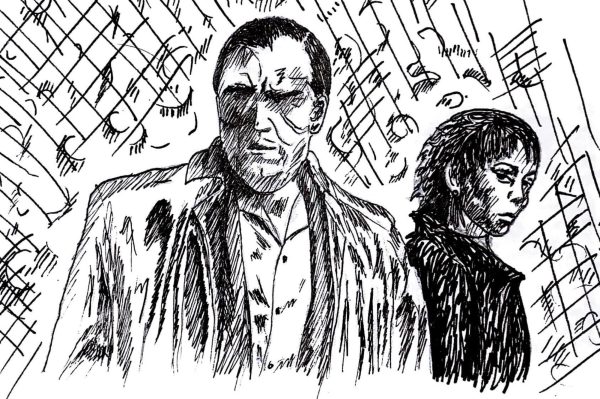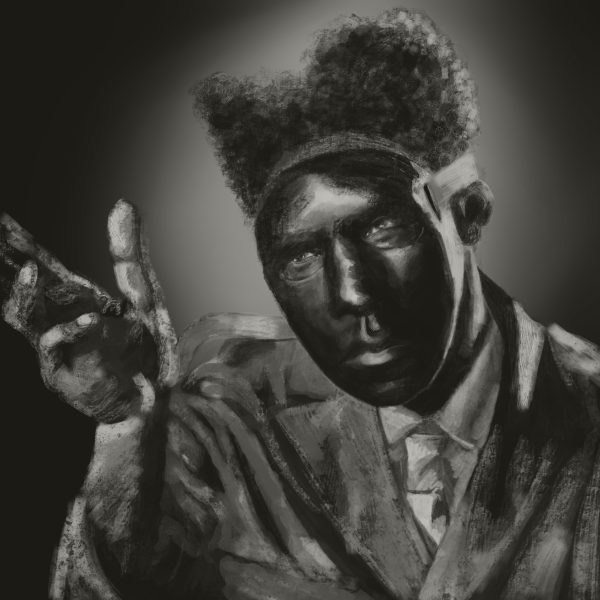Trinity’s annual Mid-Autumn Festival
A night celebrating an ancient Chinese festival with mooncakes, lions and connection
Vietnamese Student Association (VSA)
VSA students handing out food at the Mid-Autumn Festival.
Last Saturday as dusk approached, students filed onto the Jim Potter IM Field to eat moon cakes, drink boba tea, participate in luck lotteries, run from the “dragons” and enjoy the age-old tradition of the Mid-Autumn Moon Festival. Having been celebrated for thousands of years, the festival is a major holiday in China (similar holidays are celebrated across East and Southeast Asia). The festival is usually held on the 15th day of the eighth Chinese lunisolar calendar month and corresponds with the “Harvest Moon” here in the United States.
The Mid-Autumn Festival was traditionally celebrated in congruence with a successful harvest with food offerings made to honor the moon. According to senior Julie Bondy, the festival is a time to gather and share food and culture.
“[It’s a] festival where we appreciate the moon and reunite with family and eat mooncakes. At Trinity, it’s a time where students can get together, similar to family reunions. … We have mooncakes so we can share that aspect of the culture.”
Widely regarded as a delicacy, mooncakes are prepared in numerous ways but are typically filled with red bean paste or lotus seed, and in China, traditionally have a salted duck egg in the middle to symbolize the moon.
Even though the Mid-Autumn Festival is not celebrated in the Philippines, the Filipino Student Association (FSA) was out to show their support.
“In all honesty, the Philippines don’t celebrate the Mid-Autumn Festival, but we wanted to support the rest of the community who do celebrate it,” said to Lexcel Penafiel, junior and president of the FSA.
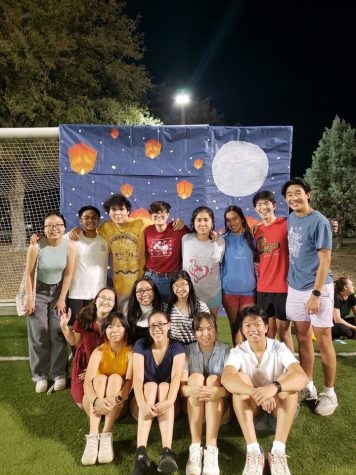
The festival was a mass effort by the Asian American and Pacific Islander clubs – a conglomerate of clubs including the Vietnamese, Filipino, South Asian Student Associations, Indigenous Peoples and Japanese Culture Clubs and the Chinese Language and Culture Association. Jie Zhang, associate professor of Chinese and co-director of the East Asian studies department, said it was “a historic thing for all the clubs from the council to work together. I see this going for the long term.”
Festival visitors could also see each club’s booths, which featured a variety of things from boba to moon cakes. Penafiel’s FSA club booth hosted the “luck lottery.”
“For this festival, we [ran] a lottery booth just for fun. They can pull from a bowl ‘lucky,’ ‘mildly bad luck’ or just ‘bad luck’ for the semester or for the year. Depending on what they get, they can get some Filipino candy if they’re lucky or if they draw a ‘mildly bad’ or ‘bad luck’ they can perform a task to redeem themselves. One of the most popular ones is to get chased by the dragon,” Penafiel said.
For students, like sophomore Arianna Loewen, it was a great time to meet and greet one another at the beginning of another semester.
“I was here last year to meet new people, it was a lot of fun,” Loewen said.
Loewen was one of the students who stopped by the FSA’s luck booth, an incident which ended with Loewen running around the IM Field as everyone stopped what they were doing to watch the spectacle.
“I had to restore my luck that was assigned to me by that table over there. I was assigned ’mildly bad luck’. It said it was ‘not the worst but not the best and I don’t want to have any kind of bad luck.”
Not wanting bad luck meant undergoing a task. In this case, Loewen fearlessly opted to get chased by the “dragons.”
“Once the dragons came out I had to ask them to chase me,” Loewen said. “I’ve never been that fast of a runner but I’m glad I did — they looked winded at the end so I was kind of proud of myself that I was able to wind the dragon.”
One of the winded “dragons,” junior Aaron Chang, explained that the dragons aren’t actually dragons at all.
“It’s actually a lion,” Chang said. “It gets mistaken all the time … It’s just nice to represent our culture as Chinese Americans and be able to be out here on campus to entertain everyone at the same time.”
Jinli He, a professor of Chinese language and literature, inaugurated the festival with a talk about the moon legends associated with the holiday and Confucius’ doctrine on how to keep family together. When asked what the festival meant to her as a Chinese native, He emphasized the celebration’s focus on family and connection.
“In China, the Mid-Autumn Festival is a date — kind of like Thanksgiving here, it’s [about] family reunion. It’s about connection.”

